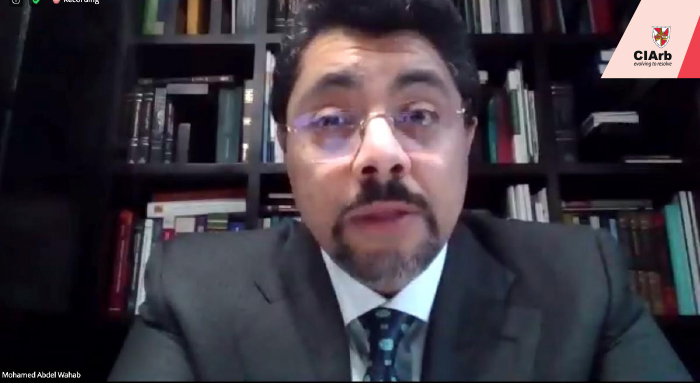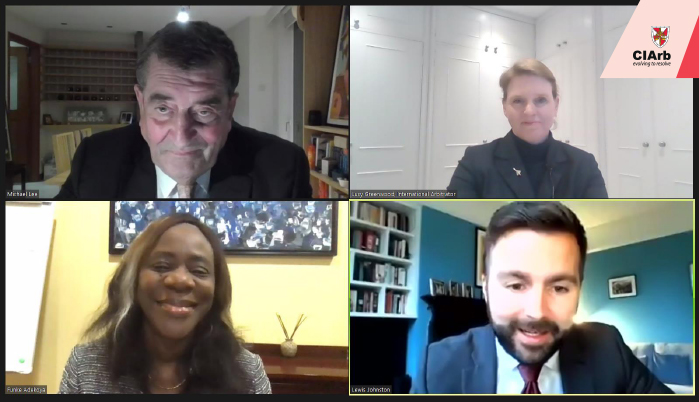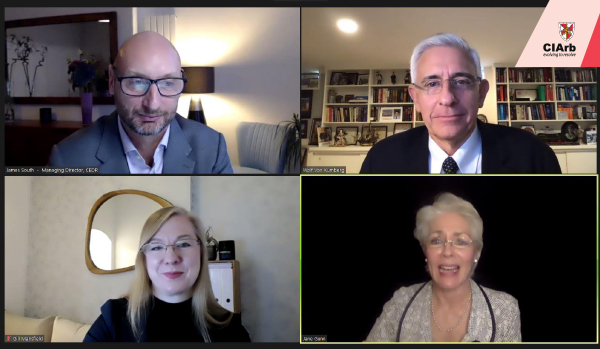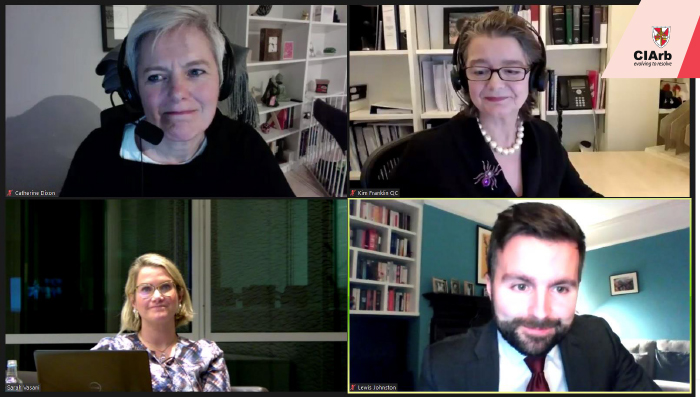CIArb News
Dispute Appointment Service (DAS) Convention 2020: Handling disputes in an era of uncertainty
27 Nov 2020
The 2020 CIArb Dispute Appointment Service (DAS) Convention kicked off with a keynote address by Professor Dr Mohammed S. Abdel Wahab, MCIArb, whose focus was on how dispute resolution is handling change and, in particular, the role of the technological revolution can play in the profession in the coming future.
Professor Abdel Wahab began his remarks quoting the famous opening lines of A Tale of Two Cities which speaks of the best and worst of times. He equated this with 2020, which he noted is the most stressful year in many people’s memories. The COVID-19 pandemic has exposed the fallacy of a static way of living and undermined our perceived sense of stability. The implication for the rule of law globally, with dispute resolution as the “jewel in the crown,” cannot be static. Indeed, as observed by Friedman, one of the strengths of the law is that it can respond to societal evolution, as well as revolution. And as noted by Darwin and Wallace, “it is not the strongest or most intelligent of a species that survives; it is those that are the most responsive to change.”

Professor Dr Mohammed S. Abdel Wahab MCIArb
This year has shaken everyone and impacted every field with dispute resolution being no exception. Many in dispute resolution seem to be in denial and not wanting to change. But certainty lies in the winds of change. And so, asks Professor Abdel Wahab, what is to be done and what is being done? What does the future hold for dispute resolution? And what lies ahead for dispute resolution practitioners? The use and development of technology cuts across these questions.
As always, the needs of the users must be at the heart of dispute resolution. CIArb, notes Professor Abdel Wahab has led the way in responding to meet the needs of users during the COVID-19 pandemic. From developing professional guidance to engaging in collaborative projects with other organisations and government to shifting training online, CIArb has sought to meet users of dispute resolutions needs, even as they have changed in a very short space of time. Dispute resolution professionals need to free ourselves from resistance to the use of technology and see it as a “4th party” in disputes that facilitates resolution.
The view of technology as a passive tool in dispute resolution is not sustainable. There is a real need to reconfigure and synchronize dispute resolution processes with technology. Such innovations as document management systems and predictive applications are just the tip of the iceberg. In order to progress further, dispute resolution needs to capitalise on the availability of big data, broadband, and increasing raw computational power. Issues such as data ownership, cybersecurity, and algorithm bias remain to be addressed on the way to such transformation.
The future of dispute resolution, says Professor Abdel Wahab, will inevitably include an increase in technology disputes in addition to technological transformation. Fintech, biotech, and AI disputes will become prevalent. There will also be an increase in disputes over renewable energy, environment, and water resources and new categories of disputes will arise in areas such as construction and telecom. This will result in a regionalisation of a large number of disputes for which Online Dispute Resolution (ODR) will become common. Dispute avoidance and management measures will also increase in importance.
As these changes occur, dispute resolution processes with change to include built-in technology-based processes such as predictive justice, automated negotiation, and AI neutrals. New processes will emerge, and dispute resolution will be more diverse than what we have currently. Processes that are less contentious, such as mediation and conciliation, are already receptive to such changes. Highly contentious processes such as arbitration and litigation are much slower to integrate such changes, but even there, changes are seen. For example, at one time all preliminary hearings in arbitration were held in person. But with the widespread availability of remote communication technology, parties now must justify why an in person preliminary hearing is necessary. Even before the pandemic, the in-person portion of disputes was limited to the evidentiary hearing. With the COVID-19 pandemic we now see that the transition to remote evidentiary hearings is possible. This has raised the question of whether a legal right to an in person hearing actually exists. Within 10 years, predicts Professor Abdel Wahab, physical evidentiary hearings will become the exception, following the evolutionary trajectory that was taken with preliminary hearings. This is unsurprising as in many common law jurisdictions, the current view is that witnesses giving evidence in person are unreliable. The practice has already changed to focus on written statements for witness evidence. This begs the question of the necessity of witness examination in arbitration. We are also witnessing the rise in paper-free arbitration and an increasing demand for expedited arbitration procedures.
In dispute resolution, the conversation around technology and AI often begins with the assumption that they play a limited role in the field. But the reality is much different, and the transformation of dispute resolution is already happening. AI applications are already being piloted in courts and cross pollination to arbitration is expected, as happened with other mechanisms, like third party funding. Professor Abdel Wahab points out that he is not advocating the use of technology in this way, but instead is pointing out that it is the reality that is already happening. As we make technological transitions, what will this mean for the human practitioner. Collaborative robots are already being well received across many industries where it is felt that such “co-bots” offer judgment-free and unbiased environment where answers are available quickly. Perhaps such AI will replace tribunal secretaries in arbitration.
Professor Abdel Wahab concluded his remarks by noting that we are currently shaping the future trajectory of AI and technology in dispute resolution as guardians. Only time will tell if we make the transition from a human centred era to a synthetic centred era. We in dispute resolution need to take a leap of faith. The future is already here and the choice is ours of which way we will go as a profession.
Professor Abdel Wahab’s inspiring address caught the essence of important in our currently uncertain world ideas which Panel 1 (Lucy Greenwood C.Arb FCIArb, Funke Adekoya C.Arb FCIArb, Michael Lee MCIArb, chaired by Lewis Johnston ACIArb) developed further and in more detail: the panellists discussed how we should look at the rapidly developing dispute resolution practice, embrace, rather than deny, the revolutionary nature of such development, triggered by challenges brought by the pandemic and inevitable impact of external factors, such as climate change or artificial intelligence, and think of what we should do to “build the profession fit for the future”.

Clockwise from top left: Michael Lee MCIArb, Lucy Greenwood C.Arb FCIArb, Lewis Johnston ACIArb and Funke Adekoya C.Arb FCIArb
The panellists emphasised that it is important to remain optimistic about what we have learned from issues that have been practically forced upon everyone, and, more importantly, have achieved in 2020. In the legal profession, dispute resolution practitioners have undeniably had to adapt their work arrangements, homes and even lifestyles in conformity with lockdown requirements. Even though remote hearings, which not long ago we were rather sceptical about, have in most scenarios become the only possible way to approach dispute resolution, not all jurisdictions have been able to adapt to the new reality with flying colours. As Funke pointed out, online hearings have been the most challenging and have introduced an “inequality of arms” between developed and developing countries, where parties struggle to find access to appropriate software, equipment and facilities and have uninterrupted meetings, cross-examinations and make other procedural arrangements.
Lucy gave the audience a chance to look at the bright side of the crisis: more than 400 conferences that have taken place in 2020 alone, were held by virtue of remote means. This is almost double the number of conferences held a couple of years ago. We have been given an opportunity to have access to content, knowledge exchange and comprehensive academic discussions and thus to keep the conversation going despite almost universal isolation.
The speakers agreed that the international dispute resolution community’s response to the circumstances has been extremely efficient and, in some cases, even progressive. For instance, Africa, and Nigeria in particular, have not only widely recognised and followed efficient online dispute resolution practices, but also tried to apply them to litigation proceedings in commercial courts.
The speakers also discussed how we should be preparing to respond in the future to the same or, possibly new challenges. According to Lucy, another practical challenge that we will face is to take a fresh look at in-person hearings in general, their importance and necessity compared to virtual hearings. Dispute resolution practitioners, parties and neutrals should work on reducing their carbon footprint. Having reviewed the approach to the level of sustainability of their proceedings, parties might as a result notice significant cost-saving benefits going forward. This will also instigate diversity of arbitral appointments due to, in particular, more significant financial and “territorial” freedom. Moreover, in Michael’s opinion, some procedural steps like in-person case management conferences will soon become the relic of the past.
Panel session 2 speakers (Wolf von Kumberg FCIArb, Gill Mansfield FCIArb, James South, chaired by Jane Gunn FCIArb) looked at how can we broaden our understanding of mediation and meet the challenges and opportunities ahead.

Clockwise from top left: James South, Wolf von Kumberg FCIArb, Gill Mansfield FCIArb and Jane Gunn FCIArb
Jane kickstarted a powerful conversation about how has mediation adapted to the pandemic, what might be the future of mediation and whether we can expect it to become a primary, rather than an alternative method of resolving disputes.
The pandemic has been overwhelming for businesses. This naturally resulted in many negotiations or renegotiations between commercial parties and much wider use of mediation to that end. This process has proved that mediation is not only growingly relied on, but will get even more recognition in the post-pandemic world owing to its flexibility, time-efficiency and adaptability.
The second part of the panel discussion was dedicated to changes which mediation has undergone in the last years and ways to promote it. As Jane noted, this can be achieved, in particular, by way of hybrid processes and promotion of mediation as part of arbitration. There is a growing role for mediation in arbitration to act together and thus not only promote mediation within arbitration, but also mediation as a standalone process and there are two primary incentives: greater party autonomy in their use of different ADR processes and higher probability to make arbitration processes slightly more flexible.
In this regard, it is essential to keep in mind the fundamentals of mediation, including confidentiality and impartiality, which have not and probably should not change, explained Gill. What has undeniably changed is that judges are increasingly encouraging parties to resort to mediation, which is one of the reasons why parties are becoming more familiar with mediation processes and their accessibility, as sometimes they are a part of litigation proceedings. This, however, should not be confused with at the first sight similar, but contrasting processes in some jurisdictions, where mediation is encouraged by the judges, but also thus becomes an inevitable and therefore obligatory part of litigation (in particular in case of tiered dispute resolution clauses).
One of the concluding remarks summarizing what has been covered by the speakers was delivered by Jane. In her opinion, in promoting mediation not only the most straightforward methods might work. The uncertain times we live in make us find ways to communicate, compromise and find ourselves out of either our everyday, domestic or even global conflicts, at any stage of their development. And this is where mediators’ skills, experience and knowledge can be helpful.
Lewis Johnston opened up the third panel session on how can dispute professionals continually adapt to the needs of business.
He went on to mention how the rapidly changing reality of how business are being done in this age of global pandemic comes with its fair share of challenges for both legal professionals and businesses as well as with needs for inter-industry development for dispute resolution professionals.
Then followed the introduction of the esteemed panellists. These were Catherine Dixon, Director General of the Chartered Institute of Arbitrators; Sarah Vasani FCIArb, Partner and Head of Investor State Disputes at Addleshaw Goddard LLP; and Kim Franklin QC C.Arb FCIArb, Chartered Arbitrator and Adjudicator at Crown Office Chambers.

Clockwise from top left: Catherine Dixon (Director-General), Kim Franklin QC C.Arb FCIArb, Lewis Johnston ACIArb and Sarah Vasani FCIArb
The first question to open up the discussion circled around uncertainty. “How can ADR play a unique role in preparing for and mitigate uncertainty?”, Lewis Johnston asked the panellists.
Catherine Dixon went first, highlighting the adaptability of ADR in contrast with litigation. She then went on to focus on the global attractiveness of arbitration, not only due to its situational adaptability but also its enforceability through the New York Convention. Furthermore, she pointed out the importance of avoiding inter-party conflict resolution ending up in a zero-sum game and the power of ADR in that regard – particularly in a time of crisis like the one we are all currently facing.
Catherine Dixon went on to talk about the increased emphasis on ADR in order to avoid conflicts altogether. She continued by mentioning how informing business about this possibility is key, and how highlighting the importance of doing so is a large part of what CIArb should be doing. Furthermore, she mentioned the importance of the CIArb’ Business Arbitration Scheme, Pandemic Resolution Scheme, and Adjudication Nomination Body – as well as other bespoke ADR solutions.
Lewis Johnston mentioned the importance on focusing on the culture around settling disputes and asked the panellists for their views on the matter.
Kim Franklin was quick to take the floor. She talked about the vast plethora of options for businesses when contemplating ADR solutions. She highlighted businesses need for a direct answer to their concerns, rather than being given the broad spectrum of potential routes to dispute resolution. In this regard, adjudication is particularly well suited for the current times according to Kim Franklin.
Sarah Vasani then took over. She talked at length on the value of hitting the reset button during the pandemic and refocus on how practitioners should project certainty and security towards clients. She went on by mentioning how there definitely will be more uncertainty to come, taking climate change and uninsurable assets as a potent example. “As ADR practitioners”, she continued, “we should all look towards working with provisions that grants the client more security and strengthen how we work with uncertainty.”
Lewis Johnston then asked the panel what they would consider having been the main consequence of 2020 being the year that it has and what types of disputes they have seen come through since the pandemic hit.
Kim Franklin argued that large projects take their time to move through the system and that we therefore might not have seen the extent to which the pandemic has affected disputes in terms of sheer numbers and complexity. “This is an ideal opportunity to bolster our readiness ahead of the projected uptick in disputes coming our way. This is an ideal opportunity to prepare for both shorter and more complex disputes”, she argued.
Sarah Vasani interjected and mentioned that many of these claims have already come into the system. She mentioned the increase in debt claims as an example, where the mentality has shifted to a every-penny-counts mentality – increasing the eagerness of collecting on outstanding debt. She argued that the pandemic most likely has increased the volume of these cases, and especially smaller ones, as businesses scramble for survival amidst the uncertainty of the fallout from the pandemic.
Lewis Johnston then went on to mention how claims froze in place when the lockdown hit but then became active again following the easement of restrictions after the summer in the UK.
Catherine weighed in on this and mentioned the value of looking at the long-term trends. She mentioned the complexity of cross-border trade – being a business highly dependent on numerous external factors – as a factor that most likely will increase the interest in ADR as a way to continue with business-as-usual whilst still being able to bring claims against other parties. Additionally, Catherine argued, global competition for legal services and the rate of innovation is likely to increase.
Lewis Johnston thanked the panellists, before moving on to asking the panel about how to best offer a holistic service to clients and a solution serving the objective as well as how breaking out of the standard form for ADR could help in this regard.
Sarah Vasani went first. She mentioned how clients oftentimes claim that they have done what they can to resolve dispute, before it is revealed that it is not always the case. Here, ADR professionals can help out by challenging the old notions of the role of an ADR practitioner and help build bridges between various cultural outlooks on the role of an ADR practitioner. “The idea of voluntarily going to ADR solutions before arbitration or litigation does not happen as often as It should”, Sarah Vasani argued.
Sarah Vasani continued. The more mediation is used, the more it is proven to be a uniquely suited alternative to traditional means of conflict resolution. The alternative means of conflict relief that is possible here is unique for mediation and perfectly suited for this year in lieu of going through the courts or resorting to litigation. Sarah Vasani also argued that the value of upholding the virtues of ADR – namely efficiency, expeditious process, and less expensive procedures as a holistic mean of resolving conflict.
Kim Franklin continued by commenting on the role of cultural influences on conflict resolution. Indeed, she argued, some parties are not interested in taking control of the situation on their own and rely entirely on the tribunal to solve the situation. This scene has been adopted by the DABs and other panels, where the process are sternly governed by the tribunal. She finished by saying that she indeed projects an increase in these types of dispute solving institutions going forwards.
Catherine Dixon continued by highlighting the importance of ADR professionals informing clients of the huge toolset they have at their disposal. She argued that mediation historically has been overlooked, especially in highly contested cases. “If the historical notion can be overcome, mediation has everything going for it as an advantageous form of conflict resolution”, she argued. Catherine Dixon joins with Kim Franklin in highlighting the need for a cultural change globally in order for this to happen. This change can well be spurred on by education, guidance, and aid by organisations like CIArb.
Lewis Johnston then turned the panel’s attention to the APPG’s report, and the correct role for CIArb to take in this scenario.
Kim Franklin argued that the findings of the report were quite predictable and correct. She commented on how there needs to be honesty from the business community on account of how they conduct themselves and what steps they can do on their end towards resolving a conflict before bringing in outside counsel. Kim Franklin also warned that certain businesses sometimes opts for underpinning a conflict, rather than seeking a resolution for bureaucratic reasons or operational convenience.
She furthermore pointed to the trend that the commercial arm of a business sometimes tends to say just about anything to keep up appearances, even if what they are saying is not true. It is not before the operational side of the business notices that they cannot deliver on the commercial side’s promises that the notion of legal responsibility becomes an actuality.
What the ADR business can do to help in this regard, however, is according to Kim Franklin to be less proactive and less reactive in relation to the business client.
Catherine Dixon weighed in on the topic. She mentioned how she agrees with Kim Franklin on the importance of being proactive as counsel in relation to the party. She went on to say how important it is for CIArb to inform on the importance of these lessons and what roads to resolving disputes are available to clients. Furthermore, keeping external parties and clients informed about developments within the ADR industry is also key according to Catherine Dixon.
Sarah Vasani joined in and argued that the will to specialise in mediation or arbitration necessitates further training and incitement in order for lawyers and ADR professionals to be willing to dwell into a forum they are less comfortable working within. She mentioned how what was once seem as out of the ordinary oftentimes can become the norm once it is incorporated in the fabric of the business.
Lewis Johnston asked the panel on the digitalization of the industry and AI development.
Sarah argued that the total replacement of lawyers by AI is unlikely to happen. Legal thinking is personal and unique in that sense. However, parts of the job are definitely able to be done without a human touch. Document drafting and translation for example. Currently, it is a matter of achieving a certain level of correctness and accuracy in automation that still requires a final sign-off by a human lawyer.
Catherine Dixon argued that the impact in the long-term will be significant, but that we also have not yet seen the full scale of development. She mentioned that it will indeed affect younger lawyers to a greater degree, not least in terms of learning and early career development. Over time however, Catherine Dixon argued, the development in automation will be incorporated into the legal industry in a way that will be significant.
Kim Franklin mentioned how AI is very successful at doing certain things, for example parking enforcement. She also argued how it can free up lawyers to do more complex legal work. Finally, she mentioned how the cost of developing AI in the short term still towers over the costs of employing an actual lawyer.
Lewis Johnston closed the panel discussion.
CIArb is most grateful to DAS Convention 2020 sponsors Arbitralis - Gold Sponsor and Accura Consulting - Silver Sponsor.
12 Apr 2024
Significant progress on Advisory Centre for International Investment Law at UNCITRALIn 2017, UNCITRAL Working Group III (WGIII) was launched and was tasked with working on procedural reform of the investor state dispute settlement (ISDS) system. From 1-5 April 2024, Ciarb participated in the 48th session of WGIII in its capacity as an observer delegate.
12 Apr 2024
A promising future: Strengthening mediation through diversityWe speak to mediator and Imam Ibrahim Hussain MCIArb about mediation’s bright future, and why diversity strengthens mediation.
12 Apr 2024
RIDW24: Construction Arbitration Trends and Key TakeawaysCristen Bauer, Ciarb's Head of Policy, highlights a few key takeaways from the discussions at Riyadh International Disputes Week 24 (RIDW24)